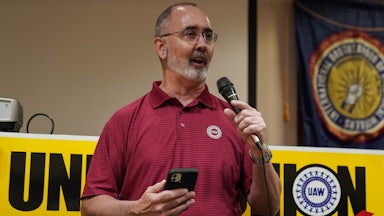This week, the federal government is moving to address the nationwide infant formula shortage that has deepened to dire levels in recent weeks, threatening the well-being of millions of children. The fixes on offer, while late in arriving, could be sufficient to ameliorate the current crisis. But these actions may not provide permanent solutions that fully contend with the underlying issues that created the emergency in the first place.
The Food and Drug Administration and Abbott Nutrition announced an agreement on Monday to take necessary steps to reopen the company’s baby formula plant in Sturgis, Michigan, in an effort to ease the supply issues that have left parents reeling. The FDA expressed confidence that the plant would reopen in two weeks, and the company has said that it could take another six to eight weeks after restarting production for its infant formula to get back on the shelves. The Sturgis plant was shut down in February after several babies who consumed formula produced there fell ill and two died.
“We really do anticipate that within a few weeks we will have things back to normal,” FDA Commissioner Robert Califf said in an interview with CNN on Monday.
The formula shortage has resulted in parents panicking as they face empty shelves, a particular problem for families with children with special nutritional needs. A recent report by research firm Datasembly found that the national out-of-stock rate for infant formula reached 43 percent the week ending May 10. Califf said on Monday there was “adequate supply” to take care of every infant in the country, just not necessarily concentrated in the right areas, and said the amount of stock on shelves only dropped to 79 percent at its lowest. Regardless of the actual numbers, it is undeniable that parents in certain locations have had significant difficulties in obtaining necessary formula.
“This was kind of a storm of a lot of factors coming together that have to do with supply chain problems that are related to Covid … and then it’s related to the issues to do with what actually happened with Abbott,” said Geri Henchy, the director of nutrition policy and early childhood programs at the Food Research and Action Center. “It’s an unusual set of circumstances.”
The formula shortage affects most families with infants to some degree. Data from the Centers for Disease Control and Prevention shows that 19 percent of infants are receiving formula before they are two days old. Only around 25 percent of babies are exclusively breastfeeding at six months, meaning that other babies’ diets are being supplemented by at least some formula. Moreover, special formula is vital for certain children and even adults with specific medical needs; as Politico noted, one disorder that affects around 2,000 people in the United States is so severe that amino acid formula is necessary for survival from birth onward.
The closure of the Abbott plant had such a dramatic effect in part because infant formula production in the U.S. is incredibly concentrated; around 90 percent of the infant formula supply is produced by four companies. The Special Supplemental Nutrition Program for Women, Infants and Children, or WIC, is the largest purchaser of infant formula in the country. Only three companies have been awarded WIC contracts to sell formula: Abbott, Mead Johnson, and Gerber, a subsidiary of Nestlé. According to data from the National WIC Association provided to The New Republic, Abbott serves more than 47 percent of the 1.2 million children who receive WIC formula benefits. WIC operates on a rebate system, meaning that companies put bids to become the sole providers of formula through WIC in a state; Abbott serves 34 states.
“One of the most concerning aspects to draw out of this crisis is just how consolidated the infant formula market is. The fact that one plant closure for a few weeks can have this level of impact on the national supply is alarming,” Brad Dittmeier, the senior director of public policy at the National WIC Association, told The New Republic. “I think it merits a review of the entire manufacturing sector.”
While WIC participants are typically limited in what brands of formula they can purchase, the Agriculture Department implemented flexibilities in light of the recall, such as allowing state WIC agencies to offer alternative sizes, forms, and brands of formula. The USDA this month urged states to continue to take advantage of those flexibilities, noting that some states are not using all of the waivers available.
But the question of whether WIC participants should have access to additional brand options on a permanent basis is a complicated one, Dittmeier said, because the current contracting process had “generated substantial federal savings” that allow the program to serve all eligible participants. Limited options can also result in certain pressures, which is why Dittmeier said the focus should be on building a “more resilient production sector and a more resilient supply.”
Henchy noted that, under current rules, WIC participants can ask for exemptions to receive another brand of formula if needed. “The WIC infant formula rebate system is a system which leverages the market for the advantage of actual WIC participants, so a significant number of people are able to participate in WIC because of those rebates,” Henchy said. “I don’t think that it is actually the problem here, I think the problem is a much broader problem.”
The FDA also announced on Monday that it would make it easier to import some infant formulas. According to the agency, the U.S. produces 98 percent of formula it consumes, but given the shortage, it had “outlined a process by which the agency would not object to the importation of certain infant formula products intended for a foreign market.” The FDA’s stringent regulations have contributed to the concentration of formula production in so few companies. Much of the formula product that comes out of Europe is illegal to purchase in the U.S., with some being rejected on technicalities like labeling requirements.
“As we’re mindful of competition in the market, we may have to explore whether imports should be allowed in the long term, and then how does that reconcile with FDA standards, particularly around safety, but also standards that they’re imposing on domestic manufacturers?” Dittmeier said.
On a press call on Monday, Susan Mayne, the director of the Center for Food Safety and Applied Nutrition at the FDA, told reporters that the agency would approve new types of formula on a case-by-case basis. “I think we’re looking at weeks, in terms of getting the imported product into the market,” Mayne said. (Nestlé said on Tuesday that it was airlifting formula from the Netherlands and Switzerland, Bloomberg reported, and is determining which other baby milks could temporarily be cleared under the new FDA guidance.) But Representative Rosa DeLauro, the chair of the House Appropriations Committee, raised concerns on Tuesday about safety, saying that “these actions do not do enough to ensure the formula FDA imports is safe for consumers.”
After weeks of uncertainty, Congress has been spurred into action. The House Oversight Committee last week sent letters to the four major manufacturers controlling 90 percent of formula production—Abbott, Mead Johnson, Nestlé USA, and Perrigo—requesting information on how they would address the shortage. Several senators sent a letter to the USDA last week urging the agency to address the issue of corporate concentration, arguing that it has “created a fragile system unable to adequately respond to shocks in the supply chain.” On Monday, a bicameral group of lawmakers asked the FDA commissioner to increase formula production, and requested the leader of the Federal Trade Commission “investigate and take action against any scams and fraud preying on shortages of formula that have made it harder for parents to care for their infants.”
The House will also vote this week on $28 billion in emergency funding to the FDA to address the shortage, including funding for more inspection staff to help prevent oversights when reviewing production facilities. The House is also bringing up a bill to grant emergency authorizations to the WIC program. (Many of the WIC flexibilities were provided by the USDA through authorities that exist because of the coronavirus pandemic, meaning that such legislation would essentially codify those actions initially taken with emergency powers.)
It’s unclear whether such bills will get bipartisan support; Republicans have been quick to criticize the Biden administration about the shortage. Any bill will likely pass the Democratic majority House, but getting legislation through the Senate may prove more difficult, as any bill would require 60 votes to overcome a filibuster, and Democrats only hold a 50-seat majority. Democratic Senator Debbie Stabenow told reporters on Tuesday that Senate Democrats would work on a companion bill to the legislation granting more authorities to WIC. “We want to make that permanent, so [families] can purchase what is available—safe and available,” Stabenow said.
Representative Jahana Hayes, who will introduce the WIC-related legislation in the House alongside Representative Bobby Scott, called the bill a “backup plan.” “There should have been a backup plan for when there was a recall, for families who receive WIC, how they would be able to access formula,” Hayes said, adding that the bill would “help us prepare” for future crises. The measure grants the USDA authority to waive certain requirements “during extenuating circumstances, such as a public health emergency or supply chain disruption.”
The House Appropriations Committee will be holding two hearings to examine the failures that led to the closure of the Abbott facility and the impact of the formula shortage. In a press conference on Tuesday, DeLauro pledged to marshal congressional resources to hold Abbott accountable. “Recalls happen, but this company has lied. It’s cut corners. It’s falsified records to cover up misdoings at the sake of infant health,” she said. DeLauro last month submitted into the congressional record a whistleblower report alleging significant wrongdoing at the Sturgis plant.
But as the Biden administration and Congress move forward, the immediate issue of difficulty obtaining infant formula remains.
“It’s really stressful, on top of everything else, that people have been going through with Covid; we’re just trying to get back to normal, and then, bam, people can’t find formula and they’re scared about it,” Henchy said. “So we have to do everything we can to make sure the people who are in that position have the options to maneuver to make the most of what is there so they can get what their babies need.”










